Trying Curex SLIT for my cat allergies
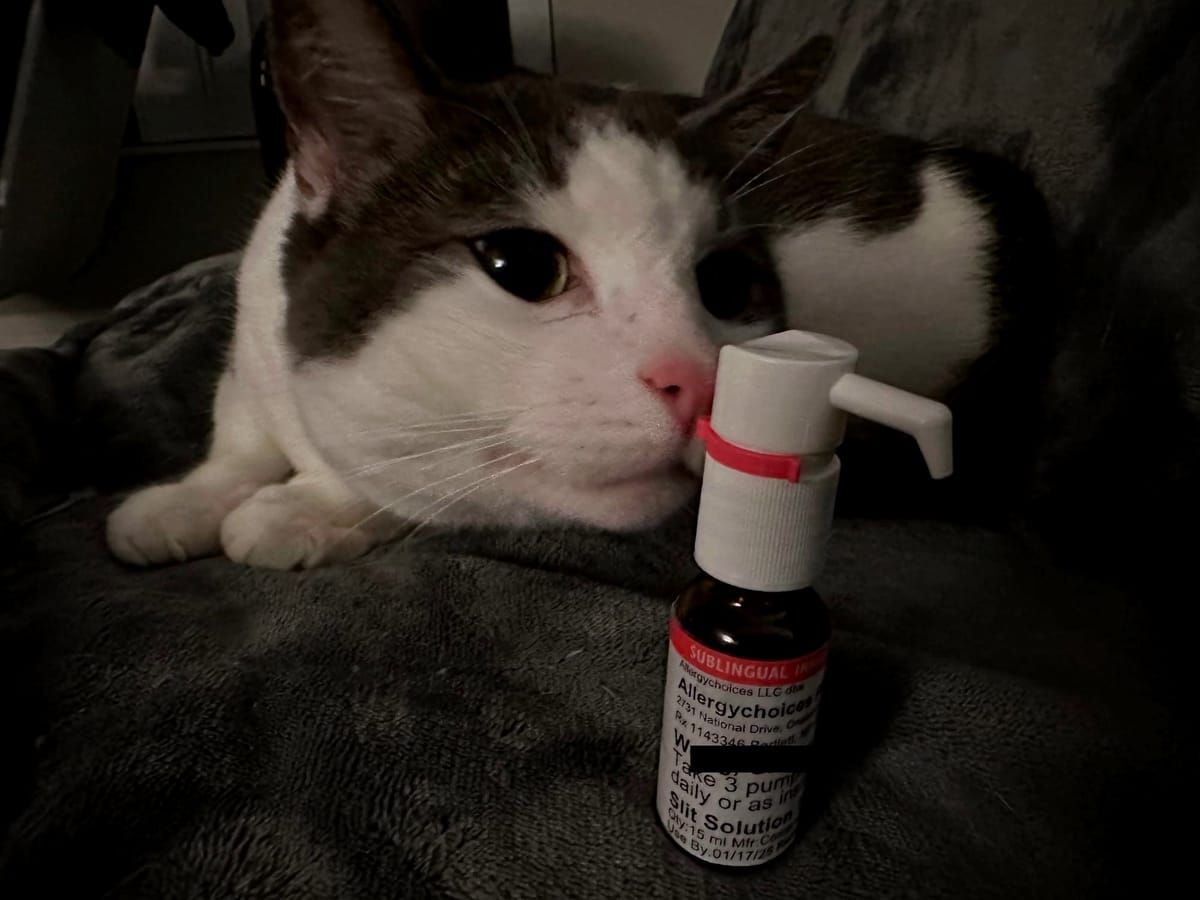
I’m hopeful I will finally achieve lasting immunity from my immune system.
Something beyond antihistamines
I started developing allergies shortly after moving to California. They make my face puffy and my head stuffy. In severe cases, the skin around my eyes itches and scales, giving me a tired and sad look. I would also get poor-quality sleep from the congestion. Then of course I sneeze frequently, which always leads to nasal discharge that leads to coughing fits from the post-nasal drip. I feel embarrassed to be in public when I experience such symptoms.
More people develop allergies today than in history. There is emerging research showing how our bodies react to excess calories by, in addition to storing them as fat, jamming them into our various bodily systems such as our immune system. This inadvertently causes hyperactivity that leads to conditions like allergies. We're built to burn excess calories regularly through physical activity, a topic for another post.
My "doing something about it" has been taking allergy medication (antihistamines) when it gets particularly bad. But taking antihistamines always bothered me because I believe it is a hack to a deep biological dysfunction. Also, with no end to it, I'll have to take it forever for lasting relief. Some research even shows that certain antihistamines increase the risk of cognitive impairment and dementia, something I'm worried about developing due to family history.
I have wanted to find a lasting remedy for my condition, and it all came together when I adopted my cat. I knew I was allergic to cats, but I didn’t realize the extent of my allergies because I never tested. Adopting a cat unknowingly was a big risk, but I knew deep inside I needed to do my cat journey no matter what (a topic for another post).
That something is immunotherapy
And thus began my research on a longer-lasting allergy treatment. I learned about immunotherapy, which is the gradual introduction of allergens for the body to get used to them. There appear to be no long-term risks, and once "cured", I can get off the treatment. I opted for the non-invasive method of sublingual immunotherapy. The name that popped up on my hits with high ratings was Curex. They cost $49/month for the bottles, not including exam fees.
The procedure sounds simple. It's a daily dose of allergens introduced into my body through the glands under my tongue so that my immune system builds tolerance. Over time, as the dose increases, my immune system should react to the allergens less and less. A 3-year program may result in lasting benefits for up to 10 years. This treatment works for 80% of people, so there's a good chance it'll work for me.
Being curious as I am, I decided to try it as there don't appear to be any risks, except cost. I can cancel my subscription anytime. At the minimum, I would have an allergy test performed without an in-office visit with an allergist because the test is done via a blood sample that can be taken from home. And I want to see for myself if immunotherapy works as I've heard mixed stories from other people who did the invasive method (monthly shots).
After getting my account set up, Curex gave me a quiz to narrow my allergens to test for and determine the extent of my allergies. Then they helped me schedule an at-home blood draw. A nurse stopped by my home for 15 minutes... at 6 am! (Being an east-coast company, their availability times were torturous). She took care of sending the sample to Labcorp, and I awaited my results.
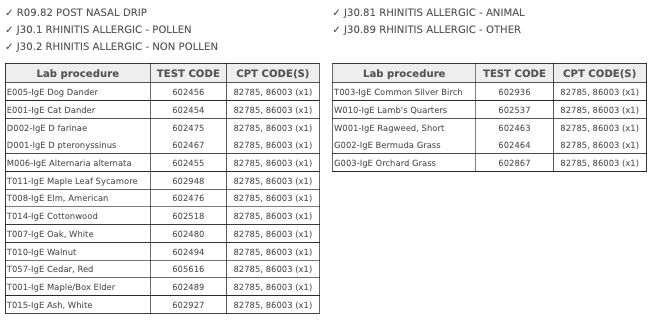
A few days later, I received a notification about a report on my dashboard. My allergy reactivity was the following:
- Very high for cat dander (go figure... 🤦🏻♀️)
- Moderate for dog dander
- Moderate for pteronyssinus (European dust mite)
- Moderate for farinae (American dust mite)
- Moderate for white oak pollen
- Moderate for mountain cedar pollen
- Moderate for orchard grass pollen
- Moderate for white ash pollen
- Moderate for common silver birch pollen
- Negative for everything else
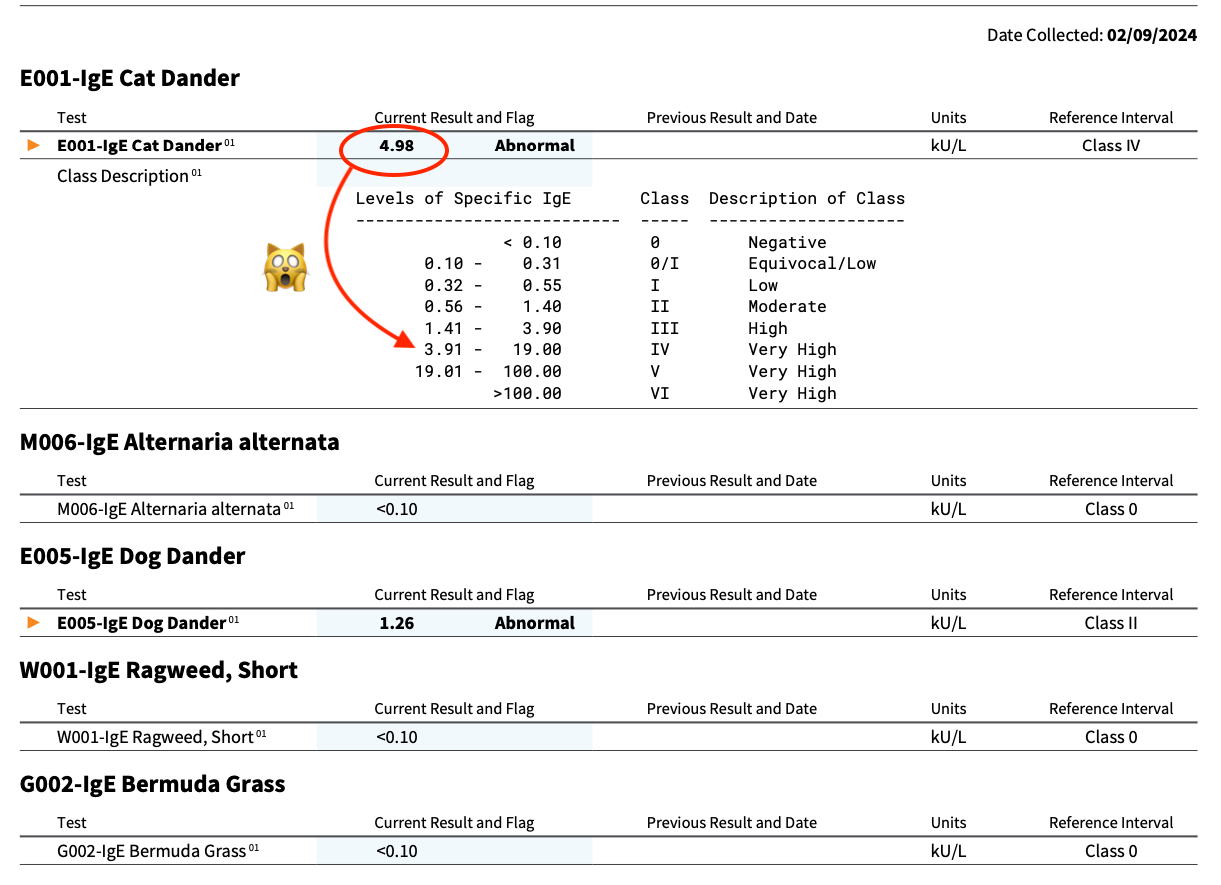
Thus began my SLIT (sublingual immunotherapy)
Curex said I was an ideal candidate and they could help lower my reactivity for all of these, starting with the cat dander. I can't imagine who wouldn't be ideal--maybe someone with extremely high reactivity to something? Still, I would think microexposure could be beneficial even for such a case, but I'm no doctor. More likely, they're filtering out people who have low reactivity to these allergens.
Before the treatment, they told me to get an epinephrine injector just in case I developed a severe allergic reaction to the drops. I doubted it would happen, but I purchased an off-brand one anyway made by Amneal that still cost me $150 (EpiPen is triple that or more). Why am I not surprised by the erratic costs of medicine in the US?
A few weeks later, a bottle of the drops arrived in the mail in a carry case. Every day I was to administer 3 drops of the liquid under my tongue, hold for 2 minutes, swallow, and not drink anything for 5 minutes. Each bottle contains about 2-3 months of liquid, and it has a particular dosage appropriate for me right now. Over time, the dosage will rise with each subsequent bottle. They said that most people see improvement in 3-6 months. I immediately started on it, hoping for the best.
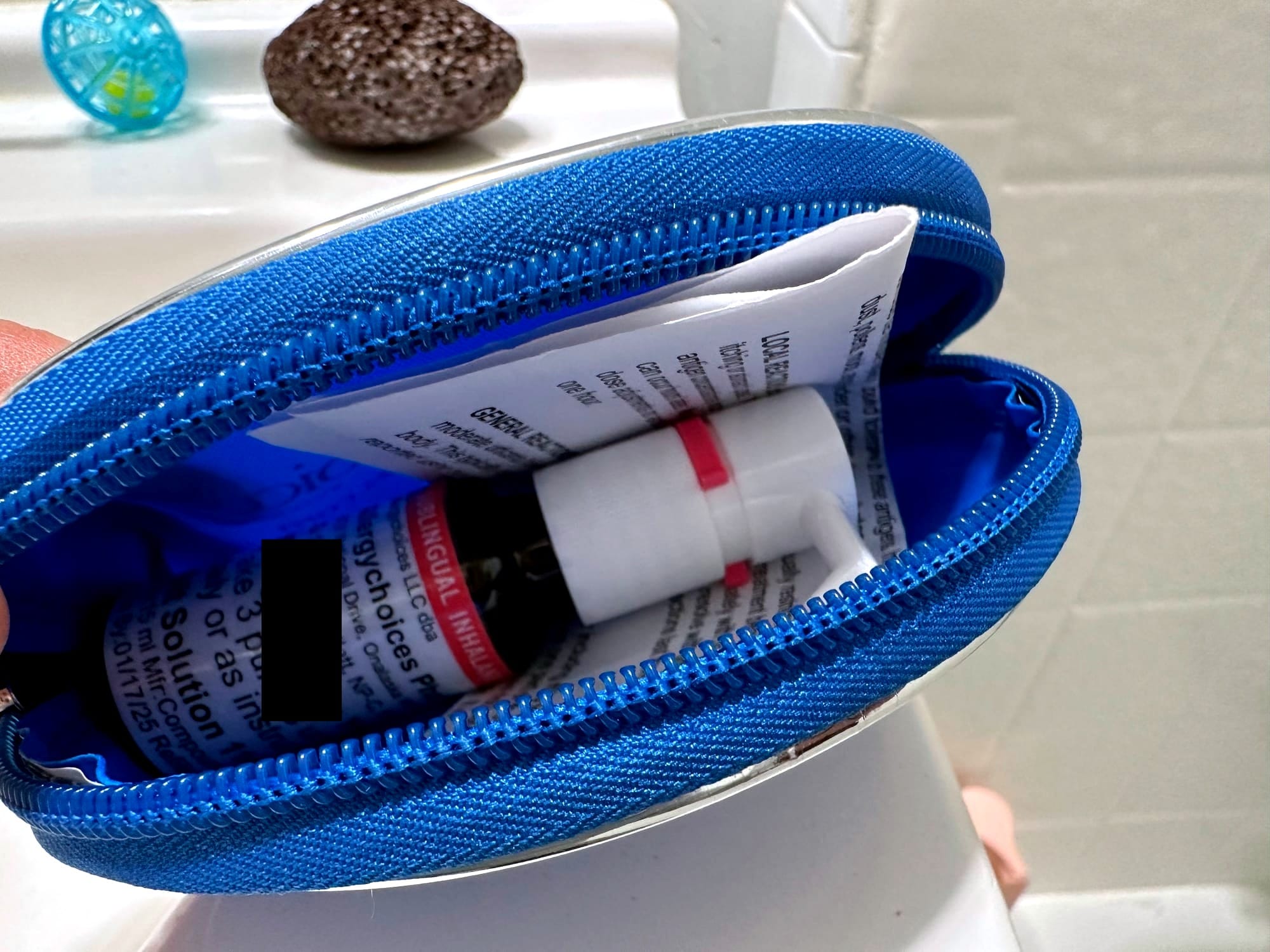
I did the treatment diligently every day, usually in the morning before I headed to work, sometimes in the evening. Overall, it was a cinch, and I always remembered to do it. I also took it with me on trips in the carry pouch. I didn't notice any side effects, except sometimes I sneezed a few seconds after administering the drops, which takes all my concentration to manage. I learned how to sneeze skillfully without spitting the solution out. (Here's to another skill I didn't think I'd need 🍻.)
Taking antihistamines less and less
As of May 2024, I’m starting my 3rd month on Curex. I think I’m starting to see results based on my reduced antihistamine consumption. Whereas previously I needed a tablet every day (and even with the antihistamines I was still itching and sneezing occasionally), now I’ve been taking it every 2-3 days, only when symptoms appear. This is a big improvement and I am quite pleased. I didn't expect to see results for a few more months!
One annoying thing about this process is the need to virtually meet a clinician every 2 months to check progress and make any adjustments to my dosage. I'm required to complete a quarterly questionnaire for the same purpose, so the meeting feels redundant and like a money grab (it's about $100 per session, which insurance should cover). But I suppose it's still better than going to the doctor's office for immunotherapy shots every month.
Another annoying thing is that they raised their price to $59/month just shortly after I subscribed. Suddenly it's starting to look less and less affordable. In 3 years, I will have spent over $2K, not including the clinician visits. All of this is insurance-eligible of course, I just happen to be on an HSA plan.
Still, some things are worth the money. With my quick progress so far, I’m hopeful I will finally achieve lasting immunity from my immune system. I'll share an update in a few months.
(Update - Nov 30, 2024)
I'm nine months into the program, and things seem to have gone well up to a few weeks ago. I haven't taken any antihistamines since June, and I rarely skipped a dose of the SLIT drops. I've done a few perfunctory quarterly surveys and video meetings to update my progress. The meetings, while annoying, tend to last only 5 minutes.
Every 3 months Curex sends me a new bottle with increasing dosages of allergens (see attached prescription details). I confirmed with the allergist that I'd need to continue on the program for at least 3 years for lasting effect, though I wonder if I would simply build and maintain allergic tolerance by living with my cat full-time and being subjected to his scratches. Since my stated objective was just to coexist with my cat allergy-free (ignoring all other allergies), then I think I could achieve it in less time than 3 years, and be off the program, saving me lots of money.
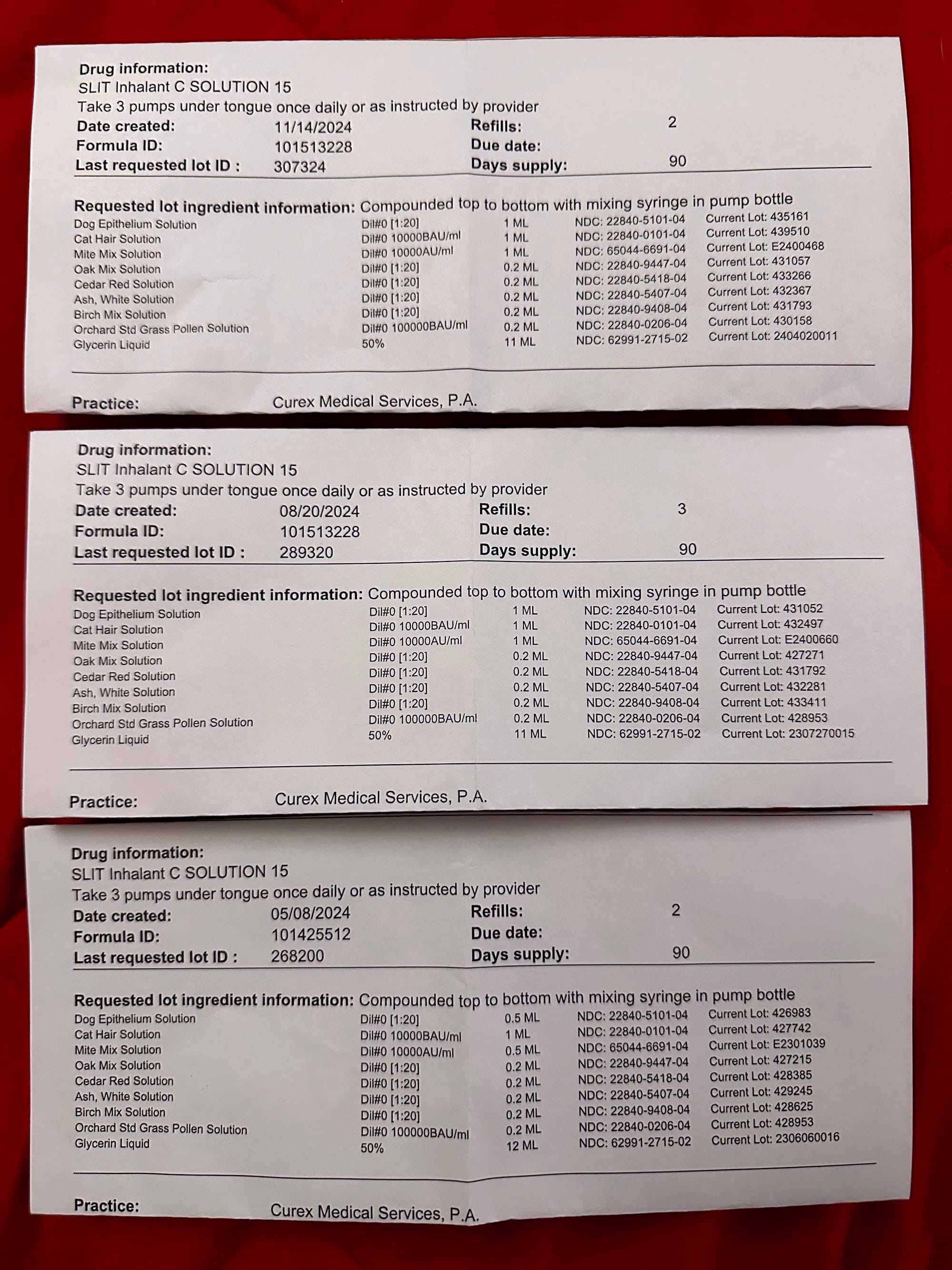
Probably the most troubling development in the past few weeks was my sudden return of SSHL. While on a business trip to Philadelphia, I suddenly lost hearing in my left ear. I've had this happen 2 times before in October/November of 2021. At the time because a short course of Prednisone corticosteroids fixed the problem, I didn't further pursue the issue with the ENT doctor. Since I've been on the SLIT program for 9 months, and I only started having SSHL now which appears to be tied to other recent triggers like travel, alcohol, exposure to a cockatoo (long story), and too much sodium, I think the SLIT is unlikely the cause. However, a chat with the ENT doctor is in order.
After a visit with the ENT and more than a week on corticosteroids, it's more likely that I have something called Cochlear Hydrops, which is related to Ménière's disease. It tends to strike people between 40-60, and more frequently women. The disease is an unexplained accumulation of fluids in the inner ear, which if left untreated, could cause permanent hearing loss. I caught this early and remedied the flareup before it caused too much damage; that said, I now have noticeably diminished hearing from this attack. I haven't stopped the SLIT while on the corticosteroids, and have stabilized the flareup as of today.